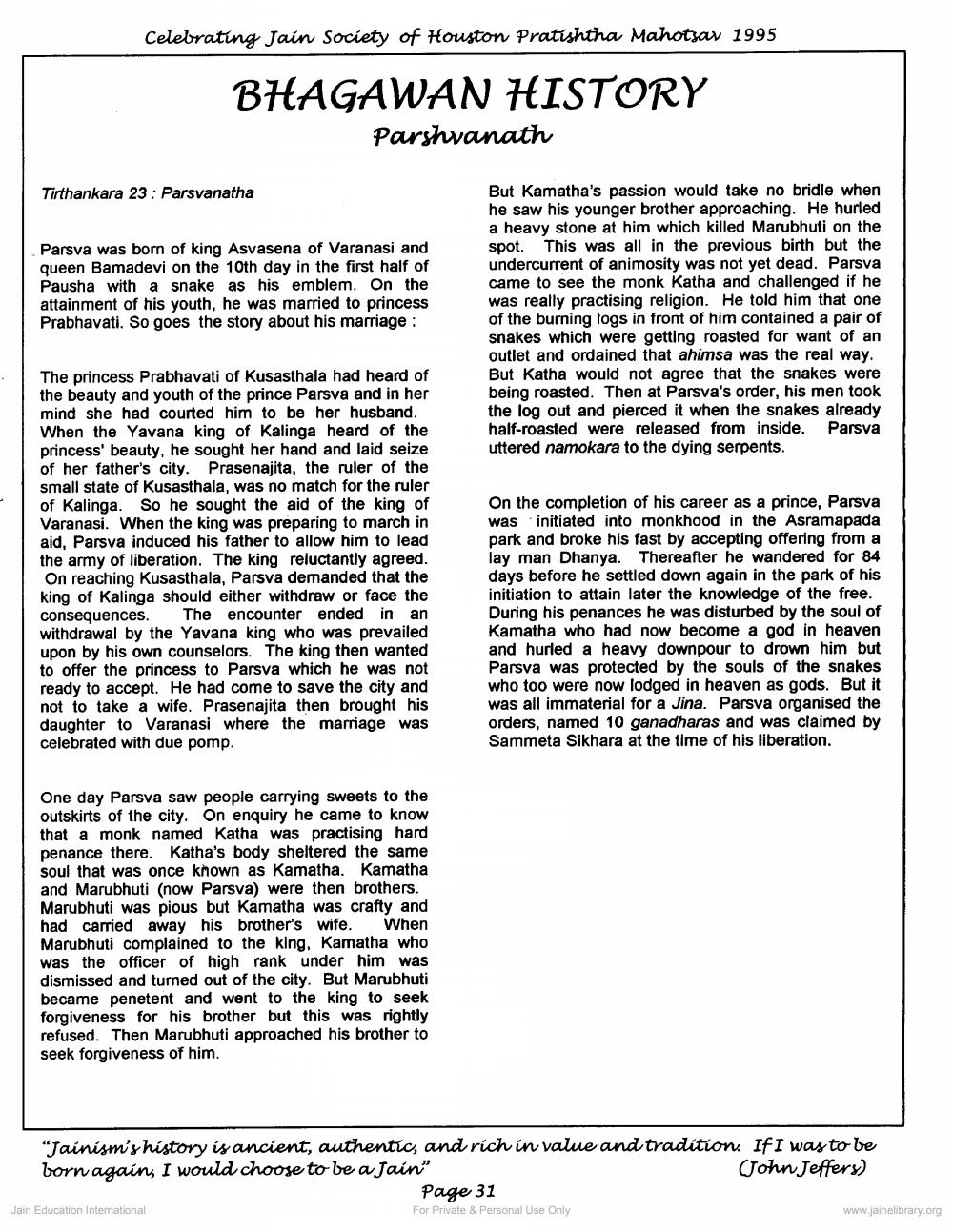________________
Celebrating Jain Society of Houston Pratishtha Mahotsav 1995
BHAGAWAN HISTORY
Parshvanath
Tirthankara 23 : Parsvanatha
Parsva was born of king Asvasena of Varanasi and queen Bamadevi on the 10th day in the first half of Pausha with a snake as his emblem. On the attainment of his youth, he was married to princess Prabhavati. So goes the story about his marriage :
But Kamatha's passion would take no bridle when he saw his younger brother approaching. He hurled a heavy stone at him which killed Marubhuti on the spot. This was all in the previous birth but the undercurrent of animosity was not yet dead. Parsva came to see the monk Katha and challenged if he was really practising religion. He told him that one of the burning togs in front of him contained a pair of snakes which were getting roasted for want of an outlet and ordained that ahimsa was the real way. But Katha would not agree that the snakes were being roasted. Then at Parsva's order, his men took the log out and pierced it when the snakes already half-roasted were released from inside. Parsva uttered namokara to the dying serpents.
The princess Prabhavati of Kusasthala had heard of the beauty and youth of the prince Parsva and in her mind she had courted him to be her husband. When the Yavana king of Kalinga heard of the princess' beauty, he sought her hand and laid seize of her father's city. Prasenajita, the ruler of the small state of Kusasthala, was no match for the ruler of Kalinga. So he sought the aid of the king of Varanasi. When the king was preparing to march in aid, Parsva induced his father to allow him to lead the army of liberation. The king reluctantly agreed. On reaching Kusasthala, Parsva demanded that the king of Kalinga should either withdraw or face the consequences. The encounter ended in an withdrawal by the Yavana king who was prevailed upon by his own counselors. The king then wanted to offer the princess to Parsva which he was not ready to accept. He had come to save the city and not to take a wife. Prasenajita then brought his daughter to Varanasi where the marriage was celebrated with due pomp.
On the completion of his career as a prince, Parsva was initiated into monkhood in the Asramapada park and broke his fast by accepting offering from a lay man Dhanya. Thereafter he wandered for 84 days before he settled down again in the park of his initiation to attain later the knowledge of the free. During his penances he was disturbed by the soul of Kamatha who had now become a god in heaven and hurled a heavy downpour to drown him but Parsva was protected by the souls of the snakes who too were now lodged in heaven as gods. But it was all immaterial for a Jina. Parsva organised the orders, named 10 ganadharas and was claimed by Sammeta Sikhara at the time of his liberation.
One day Parsva saw people carrying sweets to the outskirts of the city. On enquiry he came to know that a monk named Katha was practising hard penance there. Katha's body sheltered the same soul that was once known as Kamatha. Kamatha and Marubhuti (now Parsva) were then brothers. Marubhuti was pious but Kamatha was crafty and had carried away his brother's wife. When Marubhuti complained to the king, Kamatha who was the officer of high rank under him was dismissed and turned out of the city. But Marubhuti became penetent and went to the king to seek forgiveness for his brother but this was rightly refused. Then Marubhuti approached his brother to seek forgiveness of him.
"Jainism's history is ancient, authentic, and rich in value and tradition. If I was to be born again, I would choose to be a Jain”
(John Jeffers)
Page 31 Jain Education Interational
www.jainelibrary.org
For Private & Personal Use Only




